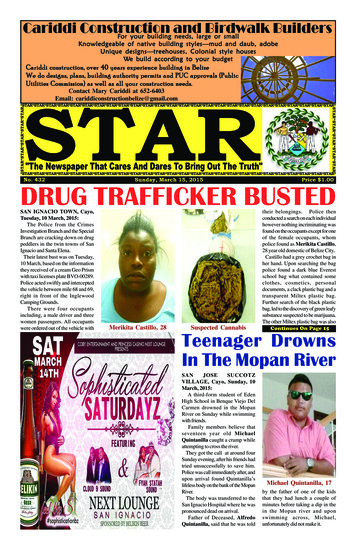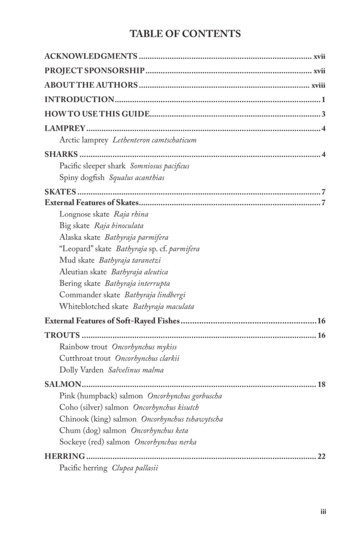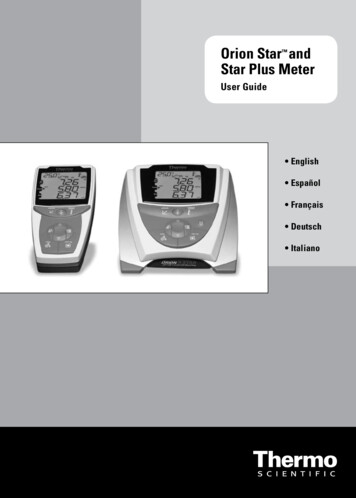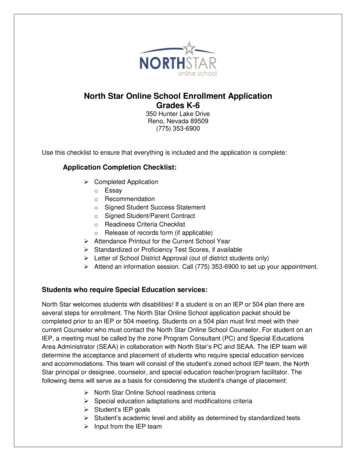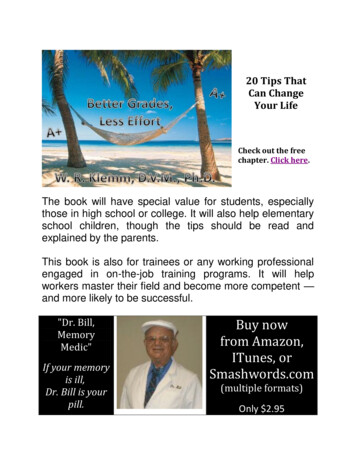
Transcription
Online Training Course LibrarySTAR Services offers a variety of online training courses that encourageconsistency and focus on quality standards for orientation, annual trainingrefreshers, and professional development. STAR's online training is fullyaccredited by the National Alliance for Direct Support Professionals.Orientation CoursesMN Statutes, Chapter 245D and Positive Supports Rule (MN Rules, Chapter 9544)Activities of Daily Living 4Data Privacy 4Documentation 4Fraud Prevention 4Healthy Diets 4Individual Rights 5Instrumental Activites of Daily Living 5Mandated Reporting: Maltreatment of Minors 5Mandated Reporting: Vulnerable Adult Maltreatment 5Medication Administration 5Positive Supports Rule 2 hour Function-Specific 6Positive Supports Rule 4 hour Function-Specific 6Positive Supports Rule Core 6Sexual Violence 6Universal Precautions 6Annual TrainingMN Statutes, Chapter 245D and Positive Supports Rule (MN Rules, Chapter 9544)Refresher: Bloodborne Pathogens 7Refresher: Data Privacy 7Refresher: Mandated Reporting 7Refresher: Positive Supports Rule Core 7Refresher: Positive Supports Rule Core and Function-Specific 7Refresher: Service Recipient Rights 7Sexual Violence 7Employment Support ServicesBenefits Planning 8Job Development and Negotiation 8Job Search Planning 8Post Employment Supports t@starsvcs.com1295 Bandana Blvd N. Ste. 135 St. Paul MN 55108
Professional DevelopmentDiagnosis-Specific and Skills CoursesCommunication Skills 9Dementia: An Introduction 9Diabetes: An Introduction 9Epilepsy and Seizure Disorders 9Fetal Alcohol Spectrum Disorders 9Fetal Alcohol Spectrum Disorders: Keys for Support 9Five Misconceptions of Being Person-Centered 9Low Vision 10Professional Boundaries 10Ten Things Not to Say 10Mental HealthAnxiety Disorders 11Borderline Personality Disorder 11Crisis Response and Behavioral Intervention 11Hoarding Disorders 11Mood Disorders 11Personality Disorders 11Psychotic Disorders 12Psychotropic Medications 12Substance Abuse and Co-occurring Disorders 12Suicide: Prevention and Response 12Values and Principles of Crisis Response 12Home and Community-Based ServicesDo not include Minnesota-specific contentFraud Prevention 13HCBS Rights 13HIPAA 13Maltreatment of Minors 13Universal Precautions 13Vulnerable Adult Maltreatment 13www.starsvcs.com/onlinetraining2
BreakoutsSegments of courses meant for review/retraining purposesBenefits Planning: Common Myths about Work and Benefits 14Benefits Planning: Disability Benefits Basics 14Benefits Planning: Introduction to Disability Benefits 101 Website 14Job Development: Action Steps for Job Negotiation 14Job Development: Creating Stand-out Resumes and Cover Letters 14Job Development: Developing Relationships and Job Networking 14Job Development: Introduction to Job Development 14Job Development: Understanding Job Accommodations 14Job Development: Writing Progress Reports 15Job Search Planning: Introduction to Employment Support and Exploration 15Job Search Planning: Introduction to Strengths Perspective 15Job Search Planning: Job Exploration and Discovery 15Medication Administration: Before You Administer 15Medication Administration: Charting Basics 15Medication Administration: Doctor and Dental Appointments, Orders, and Medication Storage 15Medication Administration: Introduction to Medication Administration 15Medication Administration: Medication Administration Basics 16Medication Administration: Medications and Treatment Errors and Discrepancies 16Medication Administration: Understanding Medications 16Post Employment Supports: Developing Strategies for Workplace Supports 16Post Employment Supports: Introduction to Post Employment Supports 16Post Employment Supports: Monitoring and Evaluation 16Positive Supports Rule 2 hr Function Specific: Evaluation of Training 16Positive Supports Rule 2 hr Function-Specific: Leading a Person-Centered Organization 16Positive Supports Rule 2 hr Function-Specific: Person-Centered Management and Decision-Making Tools 17Positive Supports Rule 4 hr Function-Specific: Applying Person-Centered Planning 17Positive Supports Rule 4 hr Function-Specific: Data Systems 17Positive Supports Rule 4 hr Function-Specific: Functional Behavioral Assessments 17Positive Supports Rule 4 hr Function-Specific: Supervision, Coaching, and Support 17Positive Supports Rule Core: Creating Trusting Relationships 17Positive Supports Rule Core: Cultural Competence 17Positive Supports Rule Core: De-escalation Techniques 18Positive Supports Rule Core: Foundations of Person-Centered Supports 18Positive Supports Rule Core: Human Services Overview 18Positive Supports Rule Core: Permitted and Prohibited Procedures 18Positive Supports Rule Core: Positive Support Strategies 18Positive Supports Rule Core: Preferences 18Positive Supports Rule Core: Restricted Procedures, Monitoring and Responding to an EUMR 18Positive Supports Rule Core: Staff Accountability and Self-Care 19Positive Supports Rule Core: Your Role Makes a Difference 19
Orientation CoursesMN Statutes, Chapter 245DCourse NameActivities of Daily LivingCEUSHours Nurse/SW11.2/1Understanding how to be person-centered while providing personal cares is essential when supporting people withdisabilities. There are activities of daily living (ADLs) that individuals may need assistance with. This course will reviewpersonal cares and the role of staff in bringing respect and dignity to the individuals supported.Data Privacy11.2/1This course gives an introduction to the state and federal privacy regulations governing services for people with disabilities.Information includes rights as well as privacy safeguards. This course meets the general training requirements on MinnesotaData Privacy and HIPAA. Specific company policies and procedures must be covered by your agency.Documentation11.2/1This course reviews various forms of documentation that may be required on the job. Topics include documentationguidelines in compliance with Minnesota Statutes 245D and privacy regulations, as well as how to document professional,objectively and accurately. What events meet the definition of Incident and Emergency under 245D are covered. Anoverview of commonly used forms such as Daily Log Note, Health Progress Note, Incident Report and Funds Records willalso be reviewed along with person-centered practices to enhance overall quality and care.Fraud Prevention0.750.9/0.75In this course, the complexities of fraud, including its prevention and reporting are discussed. Learners review types offraud they may encounter in their work at an HCBS setting including improper service billing, fraud related to inaccuratereporting of hours worked, fraud which could happen to the personal funds and property of people supported, and more.The course includes best practices for proactive fraud prevention, real life examples, and resources of where suspectedfraud can be reported.Healthy Diets11.2/1This course provides staff with an understanding of what constitutes a healthy diet under the Centers for Disease Controland Prevention’s guidelines. Students will learn about food groups, nutritional needs, caloric balance, and how to preparehealthy foods while using person-centered approaches.www.starsvcs.com/onlinetraining4
Orientation Courses, ContinuedMN Statutes, Chapter 245DCourse NameIndividual RightsCEUSHours Nurse/SW1.51.8/1.5This course is an overview of the rights upheld and responsibilities of employees in MN Statute 245D for individualsreceiving services and further explores the implementation of 245D rights for increased understanding of how to bettersupport individuals with disabilities. This course helps meet the 245D training requirements on service recipient rights.Instrumental Activities of Daily Living11.2/1When supporting individuals with disabilities, there are instrumental activities of daily living (IADL) and skills that canhelp foster greater independence in the community. This course will explore IADLs and ways to increase an individual’sability to live in the community and live their life to the fullest.Mandated Reporting: Maltreatment of Minors11.2/1This course provides information to help the people who support minors to be able to identify, prevent and reportmaltreatment. It describes who is considered a minor, types of maltreatment they may face, warning signs to look for, aswell as real life examples to aid in recognizing suspected maltreatment. This course outlines how to appropriately preventand report suspected maltreatment and the employee’s responsibility as a mandated reporter. CMS Core Competencyareas reviewed: Safety (5)- Abuse and Neglect: Demonstrates the ability to identify, prevent and report situation of abuse,exploitation, and neglect. Includes an overview of the Minnesota Maltreatment of Minors Act.Mandated Reporting: Vulnerable Adult Maltreatment1.251.5/1.25This course provides information to help the people who support vulnerable adults to be able to identify, prevent andreport vulnerable adult maltreatment. It describes who is considered a vulnerable adult, types of maltreatment theymay face, warning signs to look for, as well as real life examples to aid in recognizing suspected maltreatment. Thiscourse outlines how to appropriately prevent and report suspected maltreatment and the employee’s responsibility asa mandated reporter. CMS Core Competency areas reviewed: Safety (5) Abuse and Neglect: Demonstrates the ability toidentify, prevent and report situation of abuse, exploitation, and neglect according to law and agency rules. Recognizessigns of abuse including the inappropriate use of restraints and works to prevents them. Includes an overview of theMinnesota Vulnerable Adult Act.Medication Administration - requires live demonstration3.54.2/3.5A collection of seven lessons that explore supporting individuals with disabilities with their medication and treatment needs.This course is developed and taught by a registered nurse and helps to meet the rules and requirements of MN Statutes245D. This course requires supplemental medication administration demonstration to complete learning on the topic.1. Introduction to Medication Administration2. Understanding Medications3. Medication Administration Basics4. Charting Basics5. Doctor and Dental Appointments, Orders, and Medication Storage6. Medication and Treatment Errors and Discrepancies7. Before You Administerwww.starsvcs.com/onlinetraining5
Orientation Courses, ContinuedPositive Supports Rule (MN Rules, Chapter 9544)Course NamePositive Supports Rule 2 hour Function-SpecificCEUSHours Nurse/SW22.4/2A two-hour function-specific training for the Positive Supports Rule (MN Rules, Chapter 9544). For license holders,executives, managers and owners in nonclinical roles from the Positive Supports Rule. Creating buy-In - including staff in organization decisions Leading with purpose and passion – creating leadership teams worth following Turning person-centered thinking and practices into organizational action Evaluating organizational training – measuring change and outcomes for persons receiving services.Positive Supports Rule 4 hour Function-Specific44.8/4A four-hour function-specific training for the Positive Supports Rule (MN Rules, Chapter 9544) . For staff who developpositive support strategies and license holders, executives, managers, and owners in nonclinical roles. Functional Behavioral Assessments How to apply Person-Centered Planning How to design and use data systems to measure effectiveness of care SupervisionPositive Supports Rule Core - requires live demonstration89.6/8Core training course for the Positive Supports Rule (MN Rules, Chapter 9544). This course provides staff the importantknowledge of how to work with the individuals they support in a positive and supportive manner, especially whenchallenging behaviors may be present. It includes fundamentals in establishing trusting relationships, the importanceof avoiding power struggles, positive de-escalation techniques, alternatives to restraints, the communicative intent ofbehaviors and causes of behavior including events and environmental factors. Positive support strategies including positivebehavior supports, the relationship between staff interactions as well as the environment will be covered. The importanceof providing person-centered service planning and delivery and how to discover the uniqueness of each person that issupported and their specific culture will be explored. This class includes the 245D training requirements on allowed,restricted, and prohibited behavioral interventions, including Emergency Use of Manual Restraint (EUMR). In order to meetthe training requirements in MN Statute 245D.061 and 245D.09, staff must additionally demonstrate competency andbe trained in their employer’s specific EUMR policy and engage in simulated experiences of administering and receivingmanual restraint procedures allowed by the license holder on an emergency basis.Sexual Violence0.50.6/0.5This course discusses the required 245D topic of strategies to minimize the risk of sexual violence including concepts ofhealthy relationships, consent, and bodily autonomy of people with disabilities.Universal Precautions0.750.9/0.75Direct support workers may come into contact with blood, bodily fluids, or infectious material in their job of supportingpeople. In this course, universal precautions for the prevention of bloodborne pathogen transmission will be explored,including definitions and concepts, exposure incidents, and the impact of bloodborne diseases. This class meets the corecompetency area of safety and supporting health and wellness. This training helps comply with OSHA requirements.www.starsvcs.com/onlinetraining6
Annual TrainingMN Statutes, Chapter 245D and Positive Supports Rule (MN Rules, Chapter 9544)Course NameRefresher: Bloodborne PathogensCEUSHours Nurse/SW0.50.6/0.5This course provides a refresher for the protection and safety when there is a possibility of exposure to bodily fluids.this training refers to diagnosis, symptoms and treatment of HIV, Hepatitis B and Hepatitis C. This course uses examplescenarios to illustrate potential situations of exposure. This includes precautions for transmission prevention, work siterequirements, medical evaluation, follow up and confidentiality. This training helps comply with OSHA requirements.Refresher: Data Privacy0.50.6/0.5This course is an annual refresher covering the state and federal privacy regulations governing services for people withdisabilities. This course uses scenario-based interactions to refresh your knowledge on data privacy. Information includesrights as well as privacy safeguards. This course meets the general training requirements on Minnesota Data Privacy andHIPAA. Specific company policies and procedures must be covered by your agency.Refresher: Mandated Reporting0.50.6/0.5This course provides a refresher of the Maltreatment of Minors Act and the Vulnerable Adult Act and an employee’sresponsibilities as a mandated reporter. This course uses example scenarios to illustrate potential situations of maltreatmentincluding neglect, physical abuse, sexual abuse and financial exploitation to aid in recognizing suspected maltreatment. Thiscourse outlines how to appropriately report suspected maltreatment and the employee’s responsibility as a mandated reporter.Refresher: Positive Supports Rule Core44.8/4This course is an annual refresher of the Positive Supports, Minnesota Rule 9544, Core training, along with thecorresponding requirements stated in Minnesota Statutes, Chapter 245D. This course covers all the training items thatconnect with person-centered approaches and ways to create positive supports while creating quality environments forthe people supported.Refresher: Positive Supports Rule Core and Function-Specific44.8/4This course explores growing and expanding supports to ensure the best outcomes for the individuals served. This coursewill explore both from successes and struggles surrounding the required topic areas in the PSR. This course is designed tomeet the annual refresher requirements for people whose job duties involve both developing positive support strategies andimplementing them. It combines the information in the Positive Supports Rule Core and 4 hour Function-Specific trainings.Refresher: Service Recipient Rights0.50.6/0.5This course provides a refresher for service and protection related rights. Identification of external resources that areavailable to the individual. This course uses example scenarios to illustrate potential situations in recognizing rightsviolations, a staff's role in exercising rights, and how to understand the distinction between what one thinks is best forthe person and what their rights really are.Sexual Violence0.50.6/0.5This course discusses the required 245D topic of strategies to minimize the risk of sexual violence including concepts ofhealthy relationships, consent, and bodily autonomy of people with disabilities.www.starsvcs.com/onlinetraining7
Employment Support ServicesCourse NameBenefits PlanningCEUSHours Nurse/SW0.750.9/0.75This course provides Employment Specialists with information about federal and state benefit program rules, associatedwork incentives and how they apply to the person’s situation. Topics include the common myths about benefits andwork, the resources and tools that are available, including the Disability Benefits 101 (DB101) website and estimatortool to find and utilize information helpful to a person seeking employment. This class also helps Employment Specialistsreach the demonstration examples for DHS competencies including providing accurate information about benefits andwork, increasing their usage of tools and other resources, and gaining confidence in navigating benefits and programsavailable to a person.Job Development and Negotiation2.53/2.5This course helps Employment Specialists learn their crucial role in the Job Development and Negotiation Services. Topicsinclude helping a person in the job search process, marketing the person’s skills to potential employers, researching andcreating opportunities for the person, organizing information gathered (e.g. create a list of employers by industry andlocation), developing relationships with the business, and negotiating accommodations and conditions (e.g. hours, wages,tasks, breaks, orientation). It also helps Employment Specialists reach the demonstration examples for DHS competenciesincluding negotiating a job and provisions of supports, creating terms of employment based on the persons interests, skills,and conditions they need for success, writing progress reports, and helping the person create resumes and cover letters.Job Search Planning1.752.1/1.75This course is designed for Employment Specialists in the role of employment exploration and employment supportservices. This class provides an introduction to employment supports and exploration activities, including encouraginginformed choice, self determination and active participation throughout the employment process. Employment Specialistswill also learn key takeaways on highlighting a person’s strengths, interests, and talents.Post Employment Supports1.51.8/1.5Although a lot of emphasis is put on finding a job, the process of maintaining a job is just as important. This course willhelp Employment Specialists support and maintain a person’s employment, and ensure the employee is included in workactivities and treated like all other employees. These lessons will look at how to manage travel and transportation, performcomprehensive job analysis (i.e., breaking down jobs into smaller tasks) and how to develop strategies for workplacesupports. This class also helps Employment Specialists reach the demonstration examples for DHS competencies.www.starsvcs.com/onlinetraining8
Professional DevelopmentDiagnosis-Specific and Skills CoursesCourse NameCommunication SkillsCEUSHours Nurse/SW0.50.6/0.5Forming relationships and connecting with people is an important part of the job. This course will help enhancecommunication skills used with coworkers and the individuals supported.Dementia: An Introduction0.250.3/0.25This course will introduce dementia, including symptoms and causes. Learners build a foundation of understanding thisdiagnosis, beginning with the specific impacts and support strategies for individuals experiencing dementia.Diabetes: An Introduction11.2/1This course includes the basics of diabetes with the Direct Support Professional in mind. Learners will discover whatdiabetes is, the main types of diabetes, symptoms of hyper/hypoglycemia, insulin monitoring and delivery methods,person-centered practices, and more. Also included in this course are interviews with people who live with diabetes, aswell as Direct Support Professionals who share their experiences of supporting someone who lives with diabetes.Epilepsy and Seizure Disorders0.750.9/0.75This course will help staff understand more about epilepsy and seizure disorders. Staff will learn to identify the commonsymptoms as well as explore how it impacts the lives of the people supported. Staff will be more prepared to support andrespond to a person before, during, and after a seizure and will learn more about the treatment and supports that can be usedto help a person with epilepsy or a seizure disorder.Fetal Alcohol Spectrum Disorders11.2/1Fetal Alcohol Spectrum Disorders (FASD) occur in approximately one of every 100 births nationally and is one of the leadingcauses of intellectual disabilities in the United States. This course is designed to help participants learn more about FetalAlcohol Spectrum Disorders as well as the behavioral, physical, and mental characteristics that are commonly associatedwith the diagnosis. Additionally, this class will discuss common misconceptions about FASD and provide insight into thisdiagnosis and its effect on the individual.Fetal Alcohol Spectrum Disorders: Keys for Support0.50.6/0.5The Substance Abuse and Mental Health Services Administration (or SAMHSA) has developed eight key components thatindividuals who support someone with FASD should keep in mind. These are key concepts that work most effectivelywhen supporting someone with FASD. They are: concrete, consistency, repetition, routine, simplicity, specifics, structureand supervision.Five Misconceptions of Being Person-Centered0.250.3/0.25This course explores five ways people misunderstand what it means to be person-centered. Gain wisdom from ourperson-centered planners and facilitators and start to explore your own views and misconceptions about responding toa person's preferences and dreams.www.starsvcs.com/onlinetraining9
Professional Development, ContinuedDiagnosis-Specific and Skills CoursesCourse NameLow VisionCEUSHours Nurse/SW0.750.9/0.75Participants in this course gain a better understanding of how vision loss and low vision affects persons supported and tolearn ways to support people with low vision in a positive way. The course covers diagnoses associated with vision loss,assistive devices and resources, and how to support an individual in a person-centered way.Professional Boundaries11.2/1When working in the human services field, maintaining appropriate and professional boundaries is important to makesure that the best possible care is being provided to the individuals supported. Many well-intentioned people haveunfortunate things happen to them because of poor boundaries. This course will introduce the idea of healthy relationshipsand professional boundaries with illustrative examples from the field. Learners will gain a better understanding of theirrole in maintaining positive boundaries and the things they should do when they see people exhibiting poor boundaries.Ten Things Not to Say0.50.6/0.5When working with individuals with a physical disability or a mobility impairment, sometimes mistakes are made in thethings said and done to try to support them. This course will look at some of the common things people say, and how tocorrect them by being more person-centered and understanding.www.starsvcs.com/onlinetraining10
Mental HealthCourse NameAnxiety DisordersCEUSHours Nurse/SW11.2/1Anxiety disorders are the most common mental health diagnosis, affecting approximately 40 million adults in a given year.There are several forms of anxiety including Gene
STAR Services offers a variety of online training courses that encourage consistency and focus on quality standards for orientation, annual training refreshers, and professional development. STAR's online training is fully accredited by the National Alliance for Direct Support Professionals. Orientation Courses

